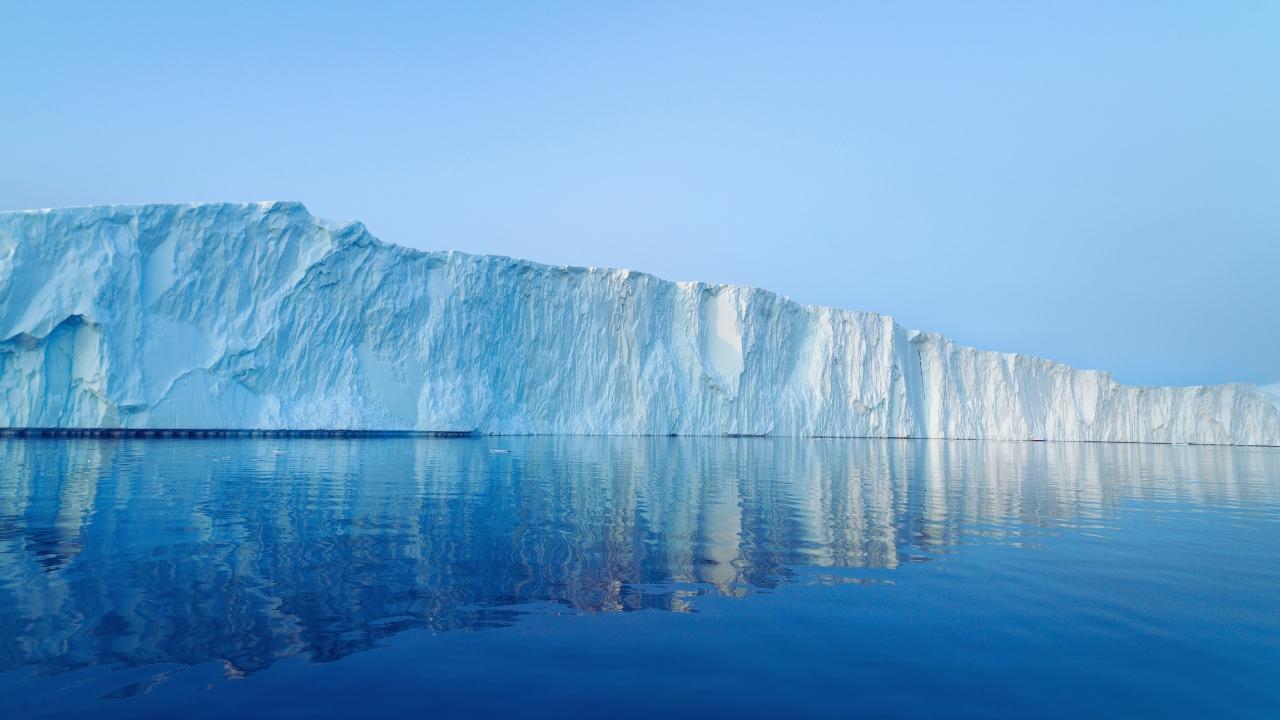You have not yet added any article to your bookmarks!

Join 10k+ people to get notified about new posts, news and tips.
Do not worry we don't spam!

Post by : Anis Farhan
Once a frozen, impenetrable expanse at the top of the world, the Arctic is undergoing a transformation that is nothing short of seismic. In the past, the polar ice cap served as a natural fortress — a region inhospitable to human settlement, economic exploitation, and military activity. Now, climate change has melted away much of that protective ice, revealing a new geopolitical playing field brimming with economic opportunity, strategic significance, and environmental risk.
The data paints a stark picture: year after year, summer ice coverage shrinks to record lows, and winter ice fails to fully recover. This steady retreat is not just an environmental concern — it is a geopolitical trigger. As new waterways open and vast resource deposits become accessible, nations are rushing to stake their claims, laying the groundwork for what could become one of the most significant power struggles of the century.
For centuries, explorers dreamed of finding a faster way to sail between Europe and Asia through the Arctic. The Northwest Passage, winding through the Canadian Arctic Archipelago, and the Northern Sea Route, skirting Russia’s northern coast, were once blocked by thick ice nearly year-round. Today, during the summer months, these routes are navigable for weeks — sometimes months — offering shipping companies potential shortcuts that could shave thousands of kilometers off traditional routes via the Suez Canal or Cape of Good Hope.
The potential savings in fuel, time, and cost are enormous. A voyage from Shanghai to Rotterdam through the Northern Sea Route can be nearly 40% shorter than via the Suez Canal. This is a logistical revolution — but one with geopolitical strings attached. Control over these routes could translate into billions of dollars in revenue and strategic leverage over global trade flows. Unsurprisingly, countries bordering the Arctic, as well as those far from it, are watching closely.
Under the United Nations Convention on the Law of the Sea (UNCLOS), countries have rights to an Exclusive Economic Zone (EEZ) extending 200 nautical miles from their coastlines. Within these zones, they control fishing, resource extraction, and certain environmental protections. Beyond these boundaries lies the high seas — but here’s the complication: countries can extend their claims if they can prove their continental shelf extends farther underwater.
Russia, Canada, and Denmark (via Greenland) have all made overlapping claims to vast swathes of Arctic seabed, particularly around the Lomonosov Ridge, a submerged mountain range that runs under the central Arctic Ocean. These claims are not mere academic exercises — beneath the seabed lie untapped reserves of oil, gas, and minerals that could fuel economies for decades. The negotiations are slow and complex, but the strategic implications are enormous.
Greenland, the world’s largest island, sits like a giant steppingstone between North America and Europe, and its strategic value is growing as the Arctic changes. It is rich in rare earth minerals, vital for modern technologies like smartphones, electric vehicles, and renewable energy infrastructure. It also hosts key U.S. military installations, including Thule Air Base, which plays a role in missile defense and Arctic surveillance.
In recent years, global interest in Greenland has intensified. The island’s government is seeking greater autonomy and economic independence, while external powers — including the United States, China, and the European Union — are looking for ways to deepen economic ties. Whoever influences Greenland’s political and economic future will gain a valuable foothold in the Arctic.
The Arctic is no longer just about polar bears and icebergs; it is becoming a theater for military posturing. Russia has invested heavily in its Arctic capabilities, reopening Cold War-era bases, building new airfields, and maintaining the world’s largest fleet of nuclear and non-nuclear icebreakers. Its military exercises in the region are a clear signal that it intends to defend its claims and maintain dominance over the Northern Sea Route.
The United States, Canada, and NATO allies have been slower to act but are now stepping up their presence. New icebreakers are being commissioned, Arctic training exercises are becoming more frequent, and radar and surveillance systems are being modernized. China, though not an Arctic nation, has also declared itself a “near-Arctic state” and is investing in polar research and infrastructure to position itself as a player in the region’s future.
Beneath the Arctic’s thawing permafrost and shrinking ice lies a wealth of resources that could reshape the global energy and mining landscape. Estimates suggest the region holds about 13% of the world’s undiscovered oil and 30% of its natural gas. Add to that the vast deposits of rare earth elements, nickel, cobalt, and other critical minerals, and the Arctic becomes a potential resource bonanza.
But extraction in such a fragile and remote environment comes with immense challenges. Harsh weather, limited infrastructure, and high costs make large-scale projects risky. Moreover, any industrial activity threatens to disrupt delicate ecosystems, pollute pristine waters, and accelerate climate impacts already underway. Balancing economic gain with environmental stewardship will be one of the defining challenges for Arctic governance.
The Arctic is not empty — it is home to more than four million people, including Indigenous groups such as the Inuit, Saami, and Nenets. These communities have lived in harmony with the region’s harsh conditions for centuries, developing cultures and livelihoods deeply tied to the land and sea.
Climate change is disrupting traditional hunting and fishing practices, threatening food security, and forcing some communities to relocate as permafrost melts and coastlines erode. At the same time, new economic opportunities — from tourism to resource jobs — are arriving. Indigenous voices are increasingly central to discussions about Arctic governance, demanding not just consultation but active decision-making power.
While geopolitics dominates headlines, the environmental consequences of a melting Arctic may be even more far-reaching. Sea ice reflects sunlight, helping regulate global temperatures. As ice disappears, darker ocean water absorbs more heat, accelerating warming in a feedback loop. Melting permafrost releases methane, a potent greenhouse gas, which could speed up climate change worldwide.
The loss of ice also disrupts ecosystems. Polar bears, walruses, seals, and seabirds depend on ice for hunting and breeding. Fish stocks are shifting, potentially sparking new disputes over fishing rights. For the rest of the planet, changes in the Arctic can alter weather patterns, contributing to extreme heat, heavy rainfall, and harsher winters elsewhere.
It might seem distant, but the Arctic’s transformation has direct implications for Asia. Shorter shipping routes through the Northern Sea Route could save time and money for exporters in China, Japan, South Korea, and other nations. Access to Arctic resources could help meet the region’s growing demand for energy and raw materials.
China has already invested in Arctic research stations, ice-capable ships, and partnerships with Russia for infrastructure along the Northern Sea Route. Japan and South Korea are also active in Arctic scientific research and commercial shipping. For Southeast Asia, the implications are less about direct access and more about the ripple effects on global trade, climate stability, and energy markets.
The Arctic Council, established in 1996, remains the primary forum for cooperation among Arctic states and Indigenous peoples. It focuses on sustainable development and environmental protection, avoiding direct security issues. But with tensions rising between Russia and Western nations, the Council’s ability to function smoothly is under strain.
The future of Arctic governance may hinge on whether countries can compartmentalize disputes elsewhere and maintain cooperation in the polar region. New frameworks or treaties could emerge, but they would need to balance economic ambitions with environmental safeguards — a task easier said than done.
The Arctic could be a model for peaceful cooperation in a rapidly changing world — or it could become another flashpoint in an increasingly fragmented global order. Much will depend on how nations choose to approach the opportunities and challenges presented by the melting ice. Will they prioritize diplomacy, sustainability, and shared prosperity, or will resource competition and strategic rivalry dominate?
One thing is certain: the Arctic is no longer a distant, frozen wilderness beyond the reach of human ambition. It is the newest frontier of globalization, a place where climate change, technology, economics, and geopolitics collide. Decisions made there in the coming years will echo far beyond the polar circle, shaping the 21st century in ways we are only beginning to understand.
This article is intended for informational purposes and reflects publicly available information on Arctic geopolitics, climate change, and related issues. It does not represent the official position of any government or organization.










Two Telangana Women Die in California Road Accident, Families Seek Help
Two Telangana women pursuing Master's in the US died in a tragic California crash. Families urge gov

Ranveer Singh’s Dhurandhar Roars Past ₹1100 Cr Worldwide
Ranveer Singh’s Dhurandhar stays unstoppable in week four, crossing ₹1100 crore globally and overtak

Asian Stocks Surge as Dollar Dips, Silver Hits $80 Amid Rate Cut Hopes
Asian markets rally to six-week highs while silver breaks $80, driven by Federal Reserve rate cut ex

Balendra Shah Joins Rastriya Swatantra Party Ahead of Nepal Polls
Kathmandu Mayor Balendra Shah allies with Rastriya Swatantra Party, led by Rabi Lamichhane, to chall

Australia launches review of law enforcement after Bondi shooting
Australia begins an independent review of law enforcement actions and laws after the Bondi mass shoo

Akshaye Khanna exits Drishyam 3; Jaideep Ahlawat steps in fast
Producer confirms Jaideep Ahlawat replaces Akshaye Khanna in Drishyam 3 after actor’s sudden exit ov